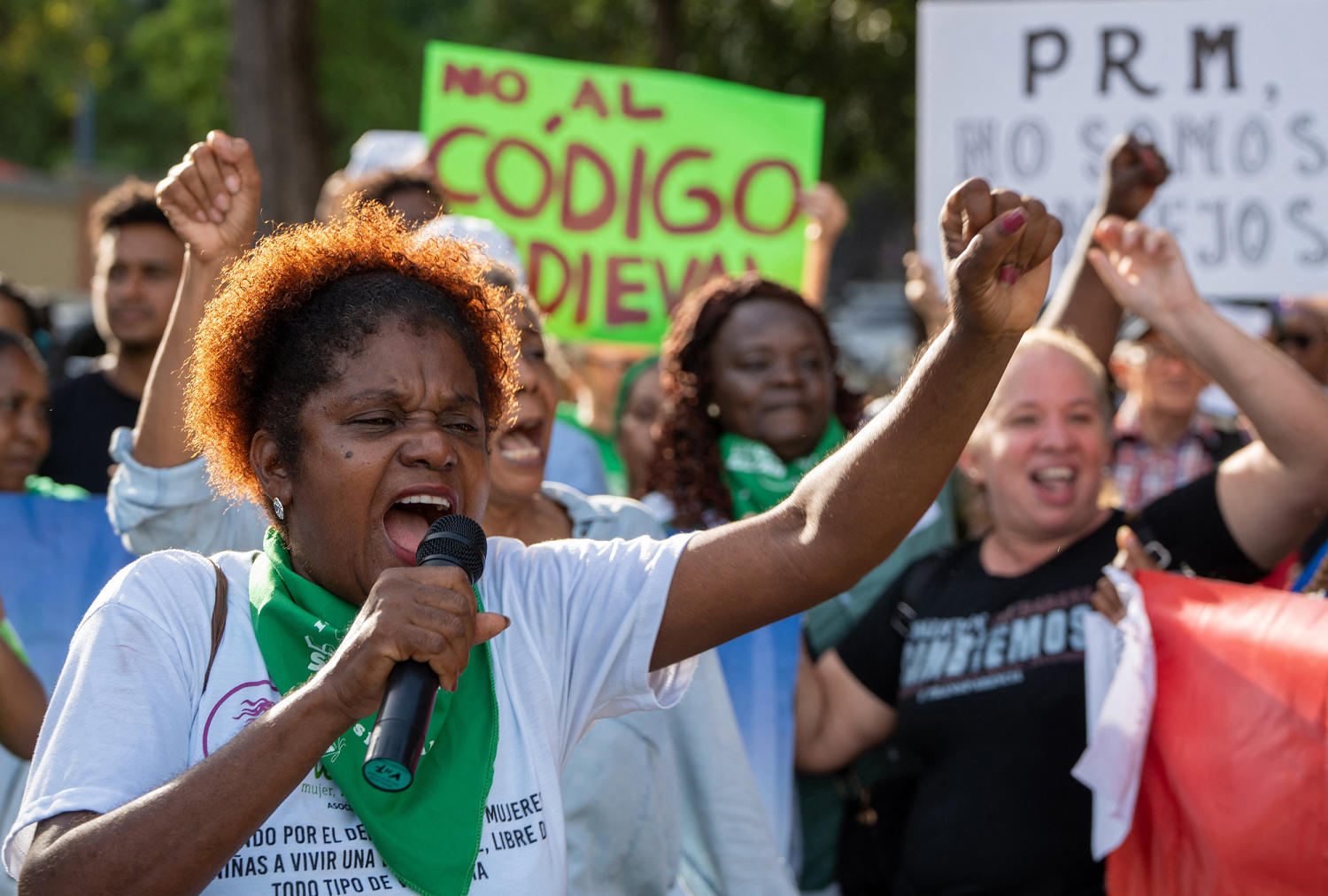
With a birthday cake in hand, well-known Dominican Republic comedian Carlos Sánchez recounted in an Instagram post how 25-year-old Winifer Núñez Beato died in 2021 after doctors on the island refused to end her high-risk pregnancy because of the country’s total abortion ban.
Núñez Beato left behind a husband and a young daughter. In the video, Sánchez said the cake is not for his birthday, but rather to mark another year where he’s asking for women not to die because of a law that stops doctors from saving their lives.
Sánchez told NBC News he felt compelled to use his platform to raise awareness because “it’s a barbarity that in this day and age a mother has to put her life at risk over a risky pregnancy that could be ended but the law prohibits doctors to do so.”
Sánchez is among many artists and activists in the Dominican Republic taking part in a social media campaign to push for amending a recently passed penal code that maintains a complete ban on abortion. Many artists have used their platforms to tell the stories of Dominican women who have lost their lives to pregnancy-related conditions.
On Instagram, singer and actress Techy Fatule tells the story of Damaris Mejia, who went to three different hospitals when she started feeling ill and had a high fever. According to Fatule, medical personnel didn’t know what to do with Mejia’s high-risk pregnancy. She was sent home with painkillers and died that night. Fatule says doctors couldn’t save her because of the ban, and ends with words, “Life is full of exceptions.”
The Dominican Republic is a conservative country that features the Bible on its flag. The country signed a concordat, or agreement, with the Vatican in 1954 making Catholicism the state religion, though the constitution allows freedom of worship.
The country’s Catholic Church backs the abortion ban, as well as evangelical groups. But Alianza Cristiana Dominicana, a group formed in 2017 by women of different Christian denominations, is pushing for the penal code to include what are known in the region as the “tres causales,” or three causes or circumstances where ending pregnancies should be allowed: when the woman’s life is at risk, in the case of rape or incest, and when fetal malformations are incompatible with life. The “tres causales” are used in other countries throughout Latin America that have eased total bans on abortion.
Alianza Cristiana Dominicana has partnered with the artists to share the stories.
So far this year, there have been 100 documented maternal deaths in the Dominican Republic. Natalia Mármol, of the Coalition for Women’s Lives and Rights, believes those lives could have been saved if abortions were legal.
“This is a fight to guarantee minimum protection for life, health and dignity for girls and women,” said Mármol. “We are asking for minimal protections, so women don’t die on a hospital bed. So a 13- or 15-year-old girl is not obliged to continue with a pregnancy that is the product of a rape. And so a woman can decide when a pregnancy is not viable.”
The Dominican Republic’s previous penal code had been in place since 1884, and efforts to reform it failed for decades. The new penal code was approved by legislators and signed into law by President Luis Abinader.
Abinader had previously expressed support for making exceptions to the abortion ban, but after winning re-election he didn’t push for changes.
After the vote, Abinader said the penal code, which covers many types of crime, “is not the ideal but it’s the best possible, since among other things, it substitutes legislation that dates back to 1884.”
Mármol said the new penal code does include points that the group advocated for, like the classification of femicide, the intentional killing of a woman or girl, as well as an increase in the severity of punishment for sexual assault.
She said the new penal code does not go into effect until August 2026 and there is time to tweak the law to include the three exceptions.
The Coalition for the Life and Rights of Women and other groups have pushed for years to have the three exceptions included, even erecting a camp in 2021 in front of the National Palace to pressure parliament.
In the Dominican Republic, women face up to two years in prison for having an abortion and doctors and midwives can receive five to 20 years for terminating a pregnancy.
Four other countries in Latin America and the Caribbean maintain a total prohibition on abortion, including Haiti, Nicaragua and El Salvador. Most of Latin America and the Caribbean allows abortion in limited cases.
Caribbean-pop singer and songwriter Isabel de Dios said she has been active in the feminist movement throughout her adulthood, often taking part in protests. Her first song, called “Colonizado,” or “Colonized,” talks about how society expects people to stay within established roles and turns a blind eye to many situations.
She called the penal code “crazy,” “dictatorial” and “feudal.”
“What kind of society are we constructing?” she said.


